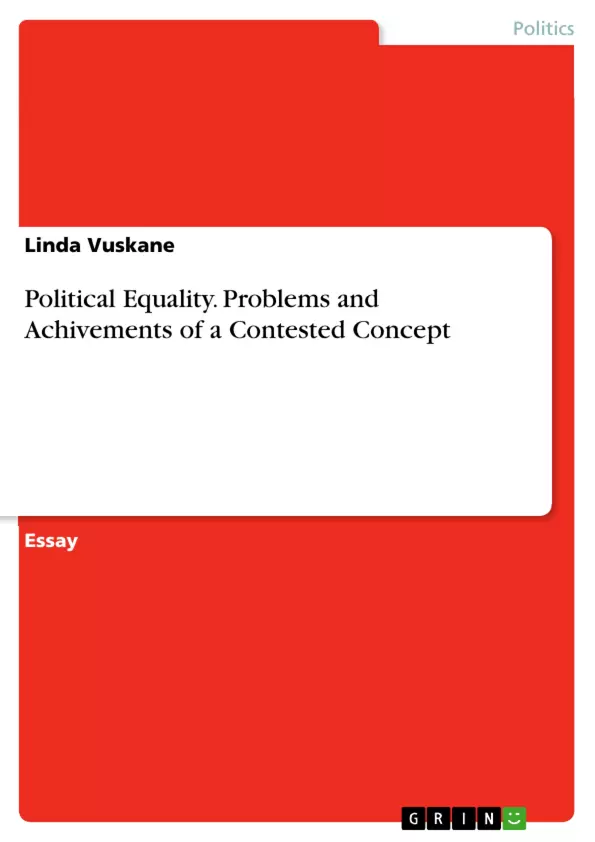This essay presents an analysis of the highly contested concept of equality. While it will touch on the issues surrounded basic equalities, the main focus will be on the concept and achievement of political equality and the problems associated with it.
The essay concludes that perhaps an absolute equality in any terms is impossible.
Different forms of equality influence each other; hence achieving one form of equality may prohibit achieving another. Many inequalities still exist today in any democratic country, not to mention those inequalities of people living under non-democratic regimes. However, change is happening, as shown by the evolution of the concept of equality. And although, the achievement of political equality in practice is undermined by the socioeconomic inequalities still existing in all societies, political equality is nevertheless, an important goal, which we have to strive for.
Inhaltsverzeichnis (Table of Contents)
- Political Equality
Zielsetzung und Themenschwerpunkte (Objectives and Key Themes)
This essay aims to analyze the concept of political equality, exploring its complexities and challenges. While acknowledging broader notions of equality, the primary focus remains on the concept and practical achievement of political equality, along with its associated problems.
- Different conceptions of equality across various political ideologies
- The evolution of the concept of equality over time
- Obstacles to achieving political equality, both formal and informal
- The relationship between socioeconomic inequality and political equality
- The impact of globalization on political equality
Zusammenfassung der Kapitel (Chapter Summaries)
Political Equality: This essay delves into the multifaceted concept of equality, primarily focusing on political equality. It examines contrasting perspectives on equality from liberal, conservative, socialist, fascist, and anarchist viewpoints, highlighting the historical evolution of the concept and its inherent complexities. The essay explores the tension between formal equality (equal rights and opportunities) and substantive equality (equal outcomes), examining how formal legal equality does not always translate into actual equality in practice. It also explores the limitations of formal equality in addressing deeply ingrained social inequalities such as racism and sexism.
Schlüsselwörter (Keywords)
Political equality, formal equality, substantive equality, socioeconomic inequality, political participation, voting rights, democracy, liberalism, conservatism, socialism, globalization, cosmopolitan democracy.
Frequently Asked Questions: A Comprehensive Language Preview
What is the main topic of this language preview?
The main topic is political equality. The preview provides a comprehensive overview of the concept, exploring its complexities, challenges, and various interpretations across different political ideologies.
What are the key themes explored in this language preview?
Key themes include different conceptions of equality across various political ideologies, the historical evolution of the concept of equality, obstacles to achieving political equality (both formal and informal), the relationship between socioeconomic inequality and political equality, and the impact of globalization on political equality.
What specific aspects of political equality are analyzed?
The analysis delves into the differences between formal equality (equal rights and opportunities) and substantive equality (equal outcomes). It examines how formal legal equality may not always translate into actual equality in practice and how it struggles to address deep-rooted social inequalities such as racism and sexism. Different perspectives on equality from various political ideologies (liberal, conservative, socialist, fascist, and anarchist) are compared and contrasted.
What is included in the language preview?
This preview includes a table of contents, objectives and key themes, chapter summaries, and keywords. It offers a structured and professional overview of the main arguments and concepts presented in the full text.
What are the objectives of this essay (as described in the preview)?
The essay aims to analyze the concept of political equality, exploring its complexities and challenges. While acknowledging broader notions of equality, the primary focus remains on the concept and practical achievement of political equality, along with its associated problems.
What are some of the keywords associated with this text?
Keywords include: Political equality, formal equality, substantive equality, socioeconomic inequality, political participation, voting rights, democracy, liberalism, conservatism, socialism, globalization, cosmopolitan democracy.
What is the scope of the discussion on political equality?
The discussion encompasses various perspectives on equality, historical context, the challenges of achieving substantive equality despite formal equality, and the influence of broader societal issues such as globalization and socioeconomic inequalities on political equality.
Where can I find more detailed information?
This is a preview; the full text provides a more in-depth analysis of the themes and concepts mentioned here.
- Arbeit zitieren
- Linda Vuskane (Autor:in), 2011, Political Equality. Problems and Achivements of a Contested Concept, München, GRIN Verlag, https://www.grin.com/document/511997



